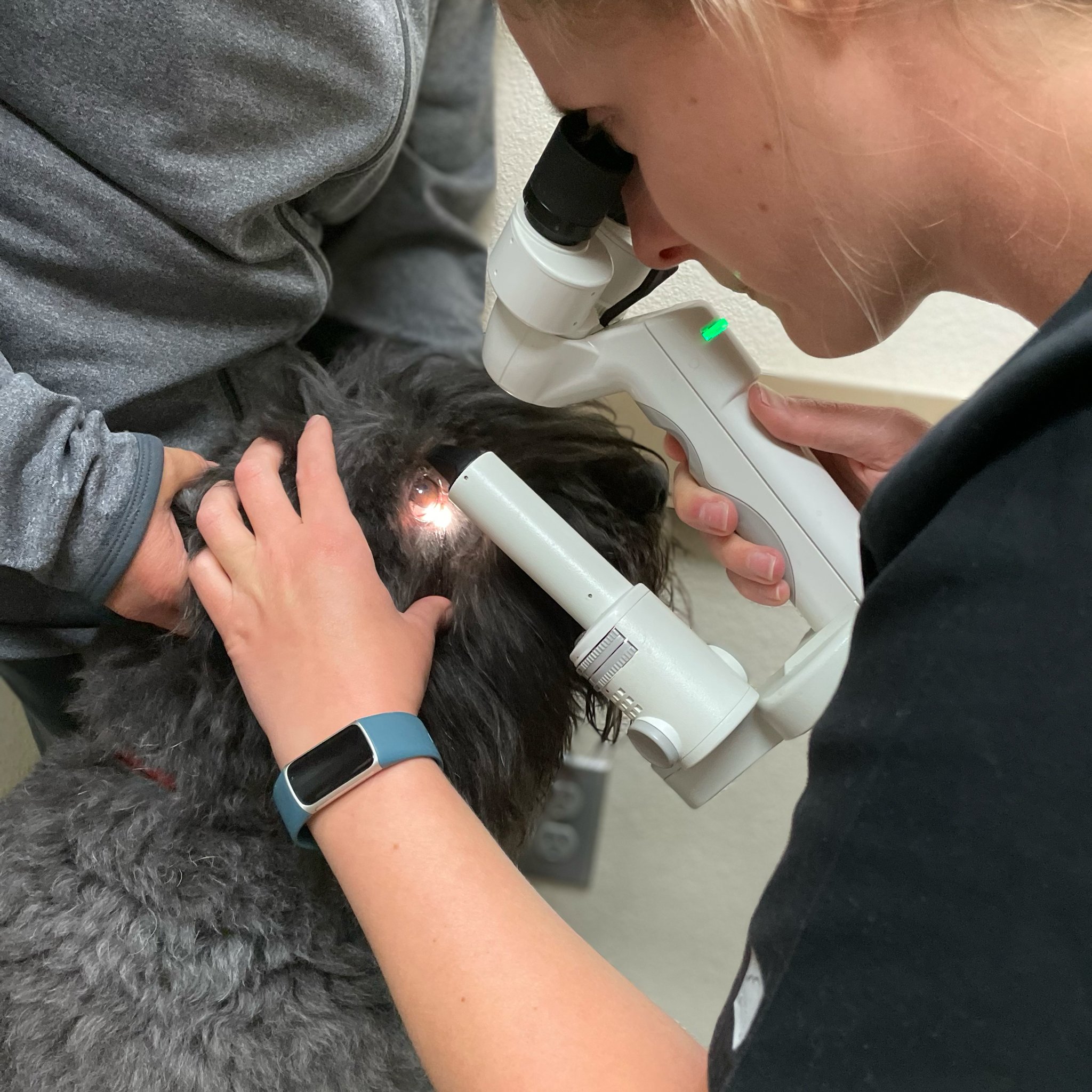
Early Detection of Canine Cancers
Cancer is the leading cause of death in all dogs. It is believed that early cancer detection in dogs will improve outcomes in cancer treatment . With the advancements in the world of genetics new genomic tests have been developed with the ability to examine hundreds of genes in the genome to identify changes. A group of multi- cancer early detection tests called MCED’s show promise for early cancer detection and are now available to veterinarians as diagnostic cancer screening tools. Some believe they are an important part of preventive care for at-risk dogs.
These tests screen for genetic biomarkers, such as DNA altered by cancer cells, in blood or other bodily fluids. As a screening test, an MCED test doesn’t diagnose cancer, but a positive finding suggests performing additional tests for the disease during the early stages when it may be more treatable.
One of the MCED test for dogs currently available is Nu.Q Vet Cancer Screening test. Nu.Q, a blood tests, looks for cancer biomarkers and claims a 97% specificity rate. The test has been shown to detect 77% of lymphomas and 82% of hemangiosarcomas. Preliminary data suggests that this screening test can also detect some instances of Mast Cell Sarcoma. Currently the manufactures of Nu.Q® Vet Cancer Test report that it is the most reliable test available for systemic cancers rather than soft tissue or localized cancers.
OncoK9 was another MCED tests, but it is no longer available as of 03/24.
Another MCED test, Oncotect Essential Dog Cancer Screening Test is noninvasive using urine and not blood. therefore it is less costly and easily adapted for home use. This test focuses on common canine cancers like lymphoma, melanoma, hemangiosarcoma, and mast cell tumors, with studies reporting a sensitivity of approx. 83% and specificity of 96% for those cancers. https://www.ccralliance.org/post/cancer- screening-tests-webinar-june-13-2024.
In January 2025 IDEXX Laboratories launched its new MCED test. The IDEXX Cancer Dx, is a diagnostic blood test panel with the goal of early detection of lymphoma in canine patients. The new panel can be added to the panels of sick pets as well as integrated into annual wellness screenings. IDEXX Cancer Dx costs as low as $15, providing professionals in the United States with actionable results within 2 to 3 days.
https://www.dvm360.com/view/affordable-early-detection-test-for-canine-lymphoma-to
The questions remains “Should all our bouvier dogs who are 7 or older be screened for cancer?”
The Bouvier Health foundation reached out to Dr. Denise Bohn, DVM with this question. She responded
“I did a search on VIN (Veterinary Information Network), and would say that there are limitations for the testing. First, if there is underlying disease that is causing inflammation, it may reduce the accuracy of the test in looking for cancer. Second, it is looking for nucleosomes in the bloodstream which are not specific to cancer (hence the concern of accuracy in some cases). The test is not specific for any cancer, and if the test comes back with positive levels (they state low, medium and high concern for cancer), then additional screening needs to be performed, such as radiographs, ultrasound, CT, aspirates/biopsies. So use as a basic screening test in a dog with no clinical symptoms, such as a golden retriever that is high risk for HSA, it may be useful.
I think the biggest thing is deciding which patients may benefit from this type of screening, and how often to screen. The test is likely not inexpensive (likely $500 or more), so screening once or twice a year may be a bit difficult for many (which would be the a potential recommendation if trying to monitor a high risk breed).
As a practitioner, I would likely start with basic screening for any patient (CBC/chem/UA, radiographs of chest and abdomen), and see what the results show me, and decide if I need to look further”.
Many specialists that discussed the testing on VIN state that they don't know how valuable this would really be, and there is not a consensus on how to utilize the test.
As Dr Bohn indicated there are multiple variables that come into play when deciding who and when to screen. Cost can be major issue that is variable depending on the breed of dog, age of dog, type of cancer being screened for, location of the veterinarian, and type of test used. Fortunately some pet health insurance plans may cover some or all of the cost of cancer screening. It's important to check with your insurance provider to determine coverage.
Here are some general estimates:
Simple blood tests for common cancers, such as lymphoma, can cost around $15-$20.
More complex tests, such as DNA-based cancer screening tests OncoK9 ( no longer available) varied from $500 - $1,000.00, while the Nu.Q cancer test cost about $122.00.
Oncotect Essential Dog Cancer Screening Test Kit costs $129.99 for a basic set and for the premium version costs $199.00
Imaging Tests:
X-rays, ultrasounds, and CT scans can cost significantly more, ranging from $200- $1000 or more, depending on the test and the facility.
Other Tests:
Biopsies and cytologies to confirm a cancer diagnosis can cost between $100-$500.
Consultations with a veterinary oncologist can cost around $200-$300.
The advancement in the understanding of the canine genome has ushered in a new era of MCED tests that can detect the presence of canine cancers. The hope is that early detection will improve the success in cancer treatment. Whether these tests should be included in routine wellness checks remains unclear. Therefore it is essential to consult with a veterinarian to determine the best screening options for your dog based on their individual risk factors.
